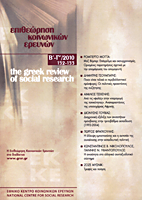Foods and poetry
Abstract
The knowledge of foods as any type of knowledge requires different approaches. The study of poetic texts of various civilizations constitutes a priceless field for the knowledge of food. In this paper we begin to look for the connections of poetical experiences and poetic texts with the knowledge of foods. In second place we analyze the poetic language and its analogies with the gastronomic language. We will see then how this knowledge contributes to appreciate food cultures, clarifying the social links weaved around food, meals, festivities. What the individuals eat, by reveals they belong to a specific culture. In the third place we will analyze the role of the symbolic value of food, because the place of the individuals in a society is represented by symbols in which these individuals recognize them. And these symbolic values conditions eating habits strongly, and even the market prices of food.
Article Details
- How to Cite
-
Μύσνικ Ζ. (2010). Foods and poetry. The Greek Review of Social Research, 132, 197–210. https://doi.org/10.12681/grsr.11
- Issue
- 2010: 132-133, Β-C
- Section
- Articles

This work is licensed under a Creative Commons Attribution-NonCommercial 4.0 International License.
Authors who publish with this journal agree to the following terms:
- Authors retain copyright and grant the journal right of first publication with the work simultaneously licensed under a Creative Commons Attribution Non-Commercial License that allows others to share the work with an acknowledgement of the work's authorship and initial publication in this journal.
- Authors are able to enter into separate, additional contractual arrangements for the non-exclusive distribution of the journal's published version of the work (e.g. post it to an institutional repository or publish it in a book), with an acknowledgement of its initial publication in this journal.
- Authors are permitted and encouraged to post their work online (preferably in institutional repositories or on their website) prior to and during the submission process, as it can lead to productive exchanges, as well as earlier and greater citation of published work (See The Effect of Open Access).



